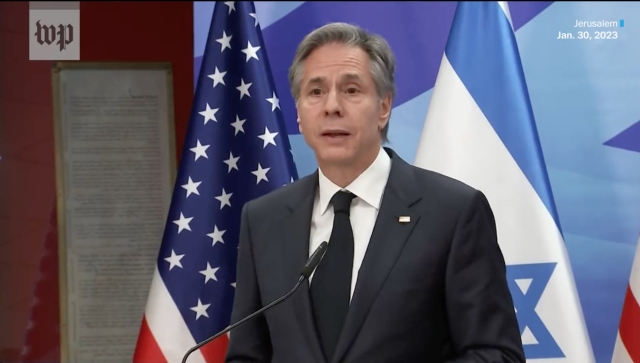As tensions simmer in the Middle East, Israel remains resolute in its commitment to national security, particularly in light of recent developments along its northern border and in Gaza. On the eve of his visit to Israel, U.S. Secretary of State Antony Blinken, while in Greece, underscored the critical nature of Israel's security. In response to recent Hezbollah aggression, Blinken reaffirmed, "Israel's readiness to defend itself is paramount, even as it seeks to avoid escalation."
Addressing the situation in Gaza, Blinken expressed concern over the loss of Palestinian lives, especially children, and announced plans to tackle humanitarian challenges in the Strip. His words reflect a balanced approach, recognizing the complexities of the conflict while emphasizing the importance of safeguarding civilian lives.
#Breaking: The Israel War Cabinet is set to convene in early evening in Jerusalem for a pre-arrival discussion before the American Secretary of State's visit. Blinken is scheduled to land in Israel tonight and will engage in meetings with the war cabinet and Israeli politicians… pic.twitter.com/5w98LbTX2m
— Open Source Intel (@Osint613) January 8, 2024
In a broader regional context, Blinken urged Middle Eastern nations to leverage their influence to moderate the conflict and break the cycle of violence. His diplomatic tour, focusing on calming tensions in Lebanon, is seen as a strategic move to prevent further escalation on Israel's northern front.
Reports from The Washington Post indicate a concern in Washington over the potential use of conflict escalation for political gains in Israel. However, Israeli defense capabilities, particularly in managing simultaneous fronts in the north and south, remain robust, as indicated by U.S. intelligence assessments.
In a striking incident, Hezbollah targeted the IAF Northern Control Unit’s computer systems on Mount Meiron. Despite the attack, the Israeli Air Force's operational capabilities remained unaffected, showcasing Israel's resilience and technological prowess. In response, the IAF conducted precise strikes on Hezbollah anti-aircraft positions in southern Lebanon, demonstrating its commitment to safeguarding Israeli airspace.
Israel-Hamas war "could easily metastasize" beyond Gaza, Sec. Blinken warns. https://t.co/bTexZqrRCV
— ABC News (@ABC) January 8, 2024
Adding to the complexity, a cyber-attack on Beirut airport by the "Soldiers of God" hacker group disrupted operations, displaying anti-Hezbollah sentiments. This incident underscores the multifaceted nature of the conflict, extending beyond conventional military confrontations.
On the Gaza front, the IDF has escalated its operations, targeting specific Hamas objectives. The strategic approach towards Rafah and the Philadelphi Route, near the Egyptian border, is under careful consideration, given the sensitive nature of military activities in these areas.
Recent successful IDF operations include the Golani Brigade's elimination of Nakhaba terrorists and the Nahal Brigade's destruction of a launch site targeting Ashkelon. Additionally, Unit 646's discovery of weapon production facilities and tunnel shafts in central Gaza highlights Israel's proactive defense strategy.
🇺🇸 US Secretary of State Antony Blinken returned to the Middle East on Sunday for the 4th time since the start of the #IsraelHamasWar.
— FRANCE 24 English (@France24_en) January 8, 2024
While in Qatar on Sunday, he pledged to tell Israel that it must do more to prevent civilian casualties in #Gaza.@camille_knight1 reports 👇 pic.twitter.com/Hs39k7d2mE
Secretary Blinken's Middle Eastern diplomatic tour, involving talks with leaders from Turkey, Jordan, Qatar, the United Arab Emirates, and upcoming discussions with Israeli officials, signifies a concerted effort to de-escalate regional tensions and avert a broader conflict.
The Israeli military's proactive stance against Hezbollah in Lebanon, particularly targeting the Iran-backed Radwan unit, reflects a strategic approach to counter cross-border infiltration threats. Rear Adm. Daniel Hagari's statement following successful operations against Hezbollah operatives reaffirms Israel's determination to defend its sovereignty.
Lt. Gen. Herzl Halevi, the Israeli military's chief of staff, emphasized the ongoing pressure on Hezbollah and Israel's readiness to engage in a more extensive conflict if necessary. The recent strikes, retaliatory in nature against Hezbollah's provocations, mark a critical juncture in Israel's defense strategy, especially in light of Hezbollah's support for Hamas and increased attacks following the killing of a senior Hamas leader in Lebanon.
Hezbollah fires 62 rockets toward Israel in 'initial response' to killing of Hamas leader.
— Rita Rosenfeld (@rheytah) January 6, 2024
Attack comes as U.S. Secretary of State Antony Blinken begins 4th Middle East diplomatic tour since Israel-Hamas war began.
Smoke rises above the southern Lebanese border village of Khiam pic.twitter.com/aIP7b6AbIN
In conclusion, Israel remains steadfast in its defense, balancing military action with diplomatic efforts to ensure national security and regional stability. The current scenario underscores the challenges Israel faces on multiple fronts, necessitating a vigilant and robust response to both immediate and long-term threats.


